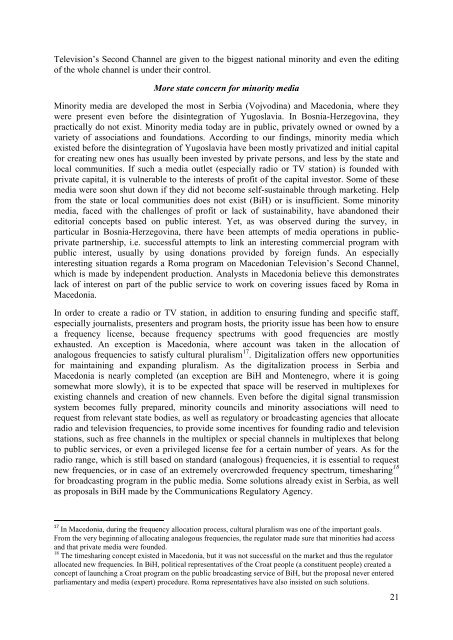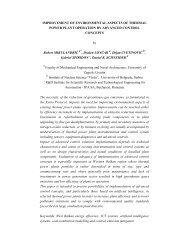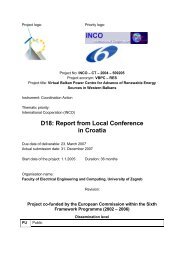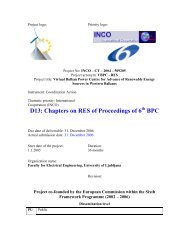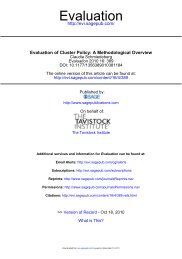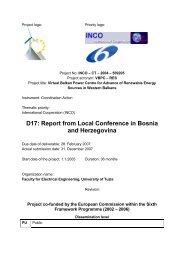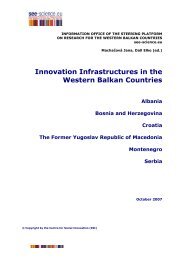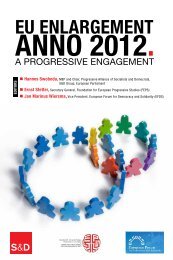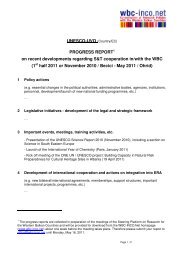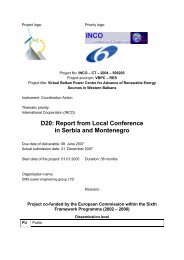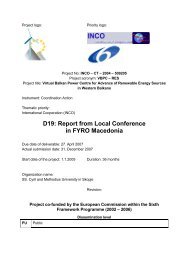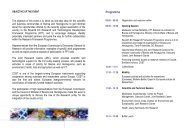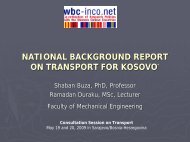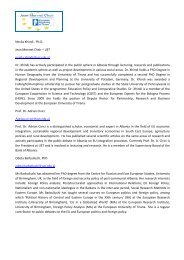MANJINE I MEDIJI NA ZAPADNOM BALKANU - RRPP
MANJINE I MEDIJI NA ZAPADNOM BALKANU - RRPP
MANJINE I MEDIJI NA ZAPADNOM BALKANU - RRPP
You also want an ePaper? Increase the reach of your titles
YUMPU automatically turns print PDFs into web optimized ePapers that Google loves.
Television’s Second Channel are given to the biggest national minority and even the editing<br />
of the whole channel is under their control.<br />
More state concern for minority media<br />
Minority media are developed the most in Serbia (Vojvodina) and Macedonia, where they<br />
were present even before the disintegration of Yugoslavia. In Bosnia-Herzegovina, they<br />
practically do not exist. Minority media today are in public, privately owned or owned by a<br />
variety of associations and foundations. According to our findings, minority media which<br />
existed before the disintegration of Yugoslavia have been mostly privatized and initial capital<br />
for creating new ones has usually been invested by private persons, and less by the state and<br />
local communities. If such a media outlet (especially radio or TV station) is founded with<br />
private capital, it is vulnerable to the interests of profit of the capital investor. Some of these<br />
media were soon shut down if they did not become self-sustainable through marketing. Help<br />
from the state or local communities does not exist (BiH) or is insufficient. Some minority<br />
media, faced with the challenges of profit or lack of sustainability, have abandoned their<br />
editorial concepts based on public interest. Yet, as was observed during the survey, in<br />
particular in Bosnia-Herzegovina, there have been attempts of media operations in publicprivate<br />
partnership, i.e. successful attempts to link an interesting commercial program with<br />
public interest, usually by using donations provided by foreign funds. An especially<br />
interesting situation regards a Roma program on Macedonian Television’s Second Channel,<br />
which is made by independent production. Analysts in Macedonia believe this demonstrates<br />
lack of interest on part of the public service to work on covering issues faced by Roma in<br />
Macedonia.<br />
In order to create a radio or TV station, in addition to ensuring funding and specific staff,<br />
especially journalists, presenters and program hosts, the priority issue has been how to ensure<br />
a frequency license, because frequency spectrums with good frequencies are mostly<br />
exhausted. An exception is Macedonia, where account was taken in the allocation of<br />
analogous frequencies to satisfy cultural pluralism 17 . Digitalization offers new opportunities<br />
for maintaining and expanding pluralism. As the digitalization process in Serbia and<br />
Macedonia is nearly completed (an exception are BiH and Montenegro, where it is going<br />
somewhat more slowly), it is to be expected that space will be reserved in multiplexes for<br />
existing channels and creation of new channels. Even before the digital signal transmission<br />
system becomes fully prepared, minority councils and minority associations will need to<br />
request from relevant state bodies, as well as regulatory or broadcasting agencies that allocate<br />
radio and television frequencies, to provide some incentives for founding radio and television<br />
stations, such as free channels in the multiplex or special channels in multiplexes that belong<br />
to public services, or even a privileged license fee for a certain number of years. As for the<br />
radio range, which is still based on standard (analogous) frequencies, it is essential to request<br />
new frequencies, or in case of an extremely overcrowded frequency spectrum, timesharing 18<br />
for broadcasting program in the public media. Some solutions already exist in Serbia, as well<br />
as proposals in BiH made by the Communications Regulatory Agency.<br />
17 In Macedonia, during the frequency allocation process, cultural pluralism was one of the important goals.<br />
From the very beginning of allocating analogous frequencies, the regulator made sure that minorities had access<br />
and that private media were founded.<br />
18 The timesharing concept existed in Macedonia, but it was not successful on the market and thus the regulator<br />
allocated new frequencies. In BiH, political representatives of the Croat people (a constituent people) created a<br />
concept of launching a Croat program on the public broadcasting service of BiH, but the proposal never entered<br />
parliamentary and media (expert) procedure. Roma representatives have also insisted on such solutions.<br />
21


